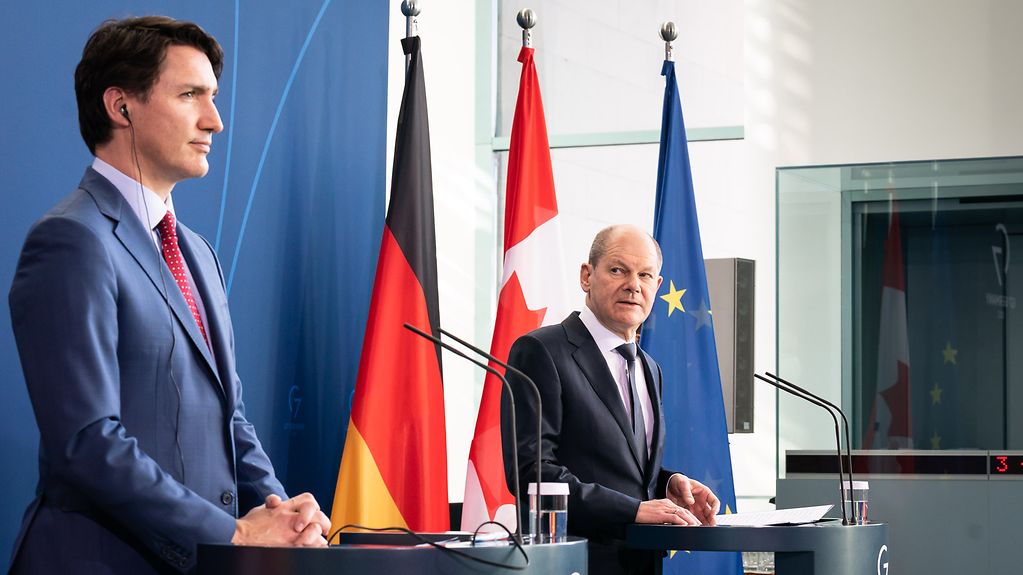Canada’s Prime Minister Trudeau in Berlin
Putin’s attack on Ukraine and the search for a diplomatic solution based on close international coordination were the main focus of talks between Federal Chancellor Scholz and Canada’s Prime Minister Trudeau. In addition, the priorities of the German G7 Presidency were discussed, in particular climate and energy policy.

Together with Canadian Prime Minister Trudeau, Federal Chancellor Scholz stressed the urgent need for a ceasefire in Ukraine.
Photo: Bundesregierung/Kugler
After the talks with his Canadian counterpart Justin Trudeau at the Chancellery, Federal Chancellor Scholz spoke of a “turning point” for Europe and the international peace order: “The Russian attack on Ukraine is a blatant breach of international law, and the world we live in is now no longer the same.” Scholz added that in view of the numerous attacks on Ukrainian cities, schools and homes, “the suffering of so many people in the war zone has left us all stunned”.
“Put an end to the bloodshed”
The Federal Chancellor stressed the urgent need for a ceasefire and appealed to Russian President Putin: “Put an end to the bloodshed. Withdraw the Russian troops! This is a disaster for the Ukrainian people – but the people of Russia are also suffering as a result of this war.”
A ceasefire was now urgently needed, said Scholz. The Federal Chancellor previously talked about the need to put a stop to the fighting at a video conference yesterday with French President Macron and China’s President Xi.
One thing was clear, he said: “A military solution to this conflict makes no sense. What we need now is a diplomatic solution.” This is what he was now trying to achieve in close coordination with international partners, said Schlolz, adding that everyone hoped the talks between Ukraine and Russia would lead to ways of resolving the situation.
Aid for Ukraine
The Federal Chancellor once again pledged Germany’s full support to Ukraine. In addition to the financial aid that Germany has been providing for many years to strengthen resilience in Ukraine, the Federal Chancellor mentioned the humanitarian aid being offered in the current situation as well as equipment and individual weapons. “Apart from this we have to think carefully about the kind of help we provide – it certainly doesn’t include fighter jets,” said Scholz.
International cohesion
Scholz said he agreed with his Canadian counterpart that there would be no going back to business as normal with Russia: “It is especially noteworthy that the UN General Assembly has fairly unanimously condemned Russia’s actions and war of aggression against Ukraine.” The global community would not tolerate or accept this action in any way, said Scholz.
Focus on climate policy
Federal Chancellor Scholz and Prime Minister Trudeau also exchanged views on long-term developments in the world: “Climate policy is a key issue here,” said the Federal Chancellor, adding that it was one of the main priorities of the German G7 Presidency, with “Germany and Canada acting side by side as like-minded partners.”
Among other things, Germany and Canada were seeking to jointly implement the “Glasgow Climate Pacts”, said Scholz. He also said that every effort should be made to ensure the global community took concerted action. “This is why we are pushing ahead with the project of an international climate club, enabling collaboration between countries that are moving forward in different ways to create a carbon-neutral world.”
These efforts were also crucial when it came to harmonising CO2 pricing, said Scholz, adding that Germany would therefore support the CO2 pricing initiative presented by Canada’s Prime Minister in Glasgow.
Common energy policy
In view of Germany’s ambitious goals to achieve climate neutrality by 2045 and the major challenges this involved in terms of heating, mobility and industrial processes, the expansion of renewable energies such as wind power, both offshore and onshore, was of particular importance, said Scholz.
“It is crucial for us to establish close cooperation on this issue – and this is what we have set out to do together.” Hydrogen from Canada was vital to the economic cooperation between the two countries, said Scholz.
The issue of raw materials was also particularly relevant, he noted, especially in the context of diversification in areas of importance to German industry. Here the Federal Chancellor made particular reference to the alternatives to the import of gas to Germany.
Together for a better world
In this connection, the Federal Chancellor spoke out in favour of sound cooperation, “for a world that is better and more caring while at the same time capable of tackling the major tasks caused by man-made climate change”. The issue of peace was currently the main concern of course, said Scholz: “We owe this to those suffering from the bombing who deserve our protection.”